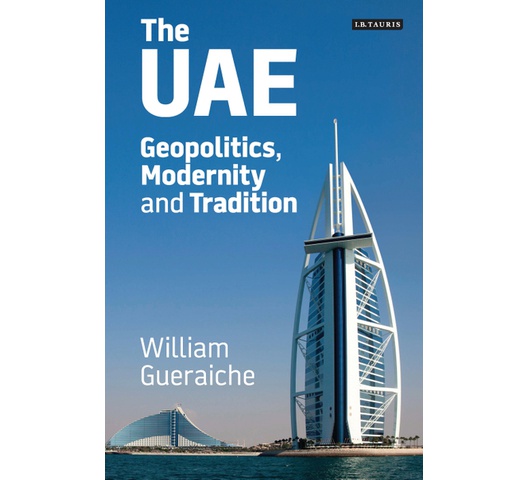
The UAE
The seven emirates that make up the United Arab Emirates were little known until the spectacular success of Dubai. The branding of the city not only raised awareness of Dubai, and brought Emiratis one of the highest standards of living in the world, it also spread positive representations of the UAE to the world at large, in striking contrast to more familiar representations of the Middle East. Advertising campaigns built a near-perfect image. The city's bold architecture, such as Burj al Arab, and futuristic projects such as the Palm Islands, helped create an image of modernity, and themes like luxury, personal safety, and excellent service were successfully used to alter western perceptions of the Arab world. Yet how does the image compare with the reality?
William Gueraiche's work is the first scholarly study of the UAE's campaign to establish itself on the international stage and to explore the impact that its economic transformation has had on the country. In particular the author compares the image – a country that is an icon of modernity open to globalization and dialogue with the western world – and the reality – a society that nonetheless seeks to maintain a closely guarded Islamic ethos. Emirati society remains at core conservative and the preservation of Arab-Islamic identity remains important, yet the UAE has the highest proportion of foreigners of any country in the world. What does this mean for the identity of Emiratis living there and what are the implications for foreigners working there?
In this engaging and deeply researched book the author also explores the environmental costs of the Dubai lifestyle – manifest in the world's highest electricity and water consumption per capita – its 'Look East' policy and increasing volume of trade with eastern Asia, and the ways in which the UAE has sought to challenge the traditional hegemony of Saudi Arabia in the region. In a final chapter the author examines the impact of the economic depression that called the whole representation of Dubai into question.
Offering a fresh perspective that goes beyond the usual polarisation of either denigrating the country or commending it unreservedly, William Gueraiche's important book will be welcomed by all those with an interest in the UAE, modernity and the wider Middle East.
William Gueraiche's work is the first scholarly study of the UAE's campaign to establish itself on the international stage and to explore the impact that its economic transformation has had on the country. In particular the author compares the image – a country that is an icon of modernity open to globalization and dialogue with the western world – and the reality – a society that nonetheless seeks to maintain a closely guarded Islamic ethos. Emirati society remains at core conservative and the preservation of Arab-Islamic identity remains important, yet the UAE has the highest proportion of foreigners of any country in the world. What does this mean for the identity of Emiratis living there and what are the implications for foreigners working there?
In this engaging and deeply researched book the author also explores the environmental costs of the Dubai lifestyle – manifest in the world's highest electricity and water consumption per capita – its 'Look East' policy and increasing volume of trade with eastern Asia, and the ways in which the UAE has sought to challenge the traditional hegemony of Saudi Arabia in the region. In a final chapter the author examines the impact of the economic depression that called the whole representation of Dubai into question.
Offering a fresh perspective that goes beyond the usual polarisation of either denigrating the country or commending it unreservedly, William Gueraiche's important book will be welcomed by all those with an interest in the UAE, modernity and the wider Middle East.
KES 21,719

International delivery
Free click & collect
| UPC | 9781786721914 |
|---|---|
| Author | William Gueraiche |
| Pages | 288 |
| Language | English |
| Format | EPUB |
| Publisher | Bloomsbury Publishing |
| SKU | 9781786721914 |
None

